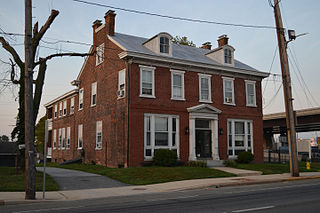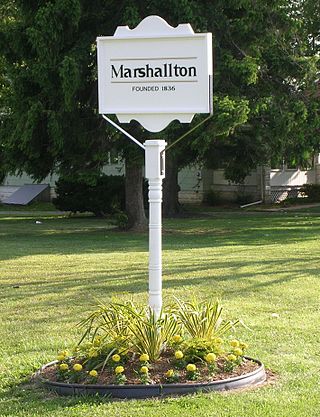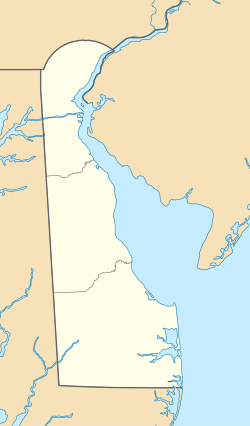
Hockessin is a census-designated place (CDP) in New Castle County, Delaware, United States. The population was 13,478 at the 2020 Census.

New Castle is a city in New Castle County, Delaware, United States. The city is located six miles (10 km) south of Wilmington and is situated on the Delaware River. As of 2020, the city's population was 5,551.

Newport is a town in New Castle County, Delaware, United States. It is on the Christina River. It is best known for being the home of colonial inventor Oliver Evans. The population was 1,055 at the 2010 census. Four limited access highways, I-95, I-295, I-495, and Delaware Route 141 intersect within one mile (1.6 km) of the town.

Wilmington station, also known as the Joseph R. Biden, Jr., Railroad Station, is a passenger rail station in Wilmington, Delaware. It serves nine Amtrak train routes and is part of the Northeast Corridor. It also serves SEPTA Regional Rail commuter trains on the Wilmington/Newark Line as well as DART First State local buses and Greyhound Lines intercity buses.

The Wilmington/Newark Line is a route of the SEPTA Regional Rail commuter rail system in the Philadelphia area. The line serves southeastern Pennsylvania and northern Delaware, with stations in Marcus Hook, Pennsylvania, Wilmington, Delaware, and Newark, Delaware. It is the longest of the 13 SEPTA Regional Rail lines.
The Wilmington and Western Railroad is a freight and heritage railroad in northern Delaware, operating over a former Baltimore and Ohio Railroad (B&O) branch line between Wilmington and Hockessin. The 10.2-mile (16.4 km) railroad operates both steam and diesel locomotives. It was added to the National Register of Historic Places as a national historic district in 1980. Wilmington & Western serves one customer for revenue service, and interchanges with CSX Transportation at Landenberg Junction, Delaware

Newark station is a train station in Newark, Delaware, on Amtrak's Northeast Corridor, serving a limited number of Amtrak Northeast Regional trains and SEPTA's Wilmington/Newark Line regional rail trains.

Newark Broad Street station is a New Jersey Transit commuter rail and light rail station at 25 University Avenue in Newark, New Jersey. Built in 1903, the station's historic architecture includes an elegant clock tower and a brick and stone façade on the station's main building. In June 1984, the station was added to the National Register of Historic Places in recognition of its historical significance.

Marshallton is an unincorporated community in Mill Creek Hundred, New Castle County, Delaware, United States. The community was founded in 1836 and is named for John Marshall, mill owner.

Orange is an active commuter railroad train station in the city of Orange, Essex County, New Jersey. One of two stops in the city, it is served by New Jersey Transit's Morris and Essex Lines: the Morristown Line to Hackettstown and the Gladstone Branch to Gladstone for trains from New York Penn Station and Hoboken Terminal. Orange station contains two low-level side platforms and three tracks.

Mountain Station is a New Jersey Transit station in South Orange, Essex County, New Jersey, United States, along the Morris and Essex. The station, built in 1915, was designed by Frank J. Nies. It has been listed in the New Jersey Register of Historic Places and National Register of Historic Places since 1984 and is part of the Operating Passenger Railroad Stations Thematic Resource.

Millington is a NJ Transit station in the Millington section of Long Hill Township in Morris County, New Jersey, United States, located at the intersection of Oaks Road and Division Avenue. It is served by the Gladstone Branch of the Morris and Essex Lines, and is one of three stops in Long Hill Township.

Mountain Lakes is a commuter railroad station in the borough of Mountain Lakes, Morris County, New Jersey, United States. Serviced by New Jersey Transit's Montclair-Boonton Line, the station is the first/last station after the Morristown Line merges/diverges at Denville station. The station consists of one low-level side platform, servicing a solo track. A station depot, built by the Delaware, Lackawanna and Western Railroad, is located in the parking lot, currently serving as a restaurant known as "The Station at Mountain Lakes".

Wilson is an Amtrak train station in Wilson, North Carolina, United States. It is located in downtown Wilson and is part of the Wilson Central Business-Tobacco Warehouse Historic District.

The Queen Anne’s Railroad was a railroad that ran between Love Point, Maryland, and Lewes, Delaware, with connections to Baltimore via ferry across the Chesapeake Bay. The Queen Anne's Railroad company was formed in Maryland in 1894, and received legislative authorization from Delaware in February 1895. The railroad's original western terminus was in Queenstown, Maryland, and was moved via a 13-mile (21 km) extension to Love Point in 1902, which shortened the ferry trip to Baltimore.

Montchanin is an unincorporated community in New Castle County, Delaware, United States. Montchanin is located at the intersection of Delaware Route 100 and Kirk Road to the northwest of Wilmington.

Railroad Terminal Historic District is a national historic district in Binghamton in Broome County, New York. The district includes 19 contributing buildings. Four of the buildings were directly related to Binghamton's rail passenger and freight operations, including the passenger station. Five buildings were built as warehouses, and ten were built to house retail activities with residential or office uses on the upper floors. The buildings were built between 1876 and 1910, with a major addition to one of them completed in 1932. This Delaware, Lackawanna and Western Railroad passenger station, with its Italian Renaissance campanile, was built in 1901. For most years of passenger service to Binghamton, Delaware and Hudson Railway and Erie Railroad trains used a different station 150 yards away.

Hopewell station is located in Hopewell, Mercer County, New Jersey, United States. The station was built in 1876. The head house has been on the state and federal registers of historic places since 1984 and was originally listed as part of the Operating Passenger Railroad Stations Thematic Resource. New Jersey Transit has proposed reopening the station to railroad service as part of the West Trenton Line.

Pennington Railroad Station is a disused train station in Pennington, Mercer County, New Jersey, United States. The station was built in 1882 by the Reading Railroad, and added to the National Register of Historic Places on December 31, 1974.

The Newport station, also known as Missouri-Pacific Depot-Newport, is a historic railroad station at Walnut and Front Streets in Newport, Arkansas. It is a long rectangular single-story brick and stucco topped by a hip roof, whose wide eaves are supported by large Italianate knee brackets. Its roof, originally slate, is now shingled, detracting from its original Mediterranean styling. A telegrapher's bay extends above the roof line on the track side of the building. The building was built in 1904 by the Missouri-Pacific Railroad to handle passenger and freight traffic.























